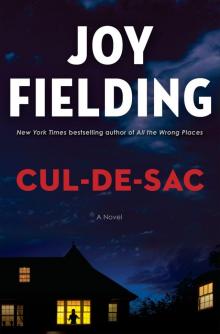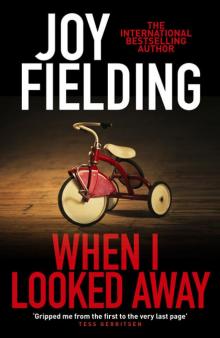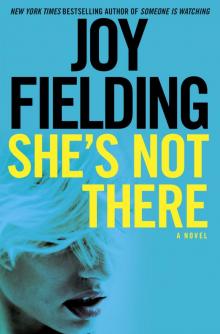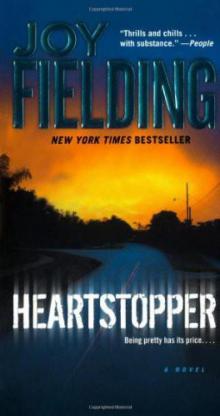- Home
- Joy Fielding
Grand Avenue
Grand Avenue Read online
PRAISE FOR THE POWERFUL NOVELS
OF NEW YORK TIMES
BESTSELLING AUTHOR
JOY FIELDING
GRAND AVENUE
“Fielding elevates her narrative with great, sweeping, surprisingly moving paragraphs devoted to the nature of friendship and family. Don’t forget to keep a family-size box of Kleenex handy in preparation for the tear-jerking finale.”
—Booklist
“[A] romantic drama with a thriller twist.… With her usual page-turning flair, Fielding [writes] a swiftly paced story that acquires real suspense when one of the characters meets a surprising fate and the meaning of friendship is put to the ultimate test.… A tense denouement.”
—Publishers Weekly
THE FIRST TIME
“Well written and enjoyable.”
—Quill & Quire
“[An] affecting drama.… Fielding is good at chronicling the messy tangle of family relationships.… A three-tissue finale.”
—Publishers Weekly
“This is rich stuff.… Fielding has created an adept study of three flawed characters who, after years of playing head games, must learn how to communicate.… Fielding has again pushed a seemingly fragile heroine to the brink, only to have her fight back, tooth and nail.”
—Booklist
“A tonic account of how one woman discovers her truest self in the face of supreme disaster.”
—Kirkus Reviews
“After a long string of successful romantic-suspense novels, Joy Fielding gives us something different, a human drama that celebrates life and love. Although you will need a box of Kleenex ready, this marvelous story will leave you cheering, even as you examine your own life and priorities.”
—Romantic Times
ACCLAIM FOR
JOY FIELDING’S PREVIOUS FICTION
“A winner.”
—People
“A page turner … maintains the suspense until the last surprising moment.”
—Maclean’s
“Anybody who’s ever been afraid of losing her looks or her husband, or rattling the skeletons in the family closet, will be hopelessly hooked.”
—Kirkus Reviews
“A knockout!”
—The New York Times
“Fielding masterfully manipulates our expectations.”
—The Washington Post
“A drama that hits home.”
—The Cincinnati Enquirer
“Dramatic and heartrending … the emotions are almost tangible.”
—Richmond Times-Dispatch
ALSO BY JOY FIELDING
The First Time
Missing Pieces
Don’t Cry Now
Tell Me No Secrets
See Jane Run
Good Intentions
The Deep End
Life Penalty
The Other Woman
Kiss Mommy Goodbye
Copyright © 2001 by Joy Fielding, Inc.
All rights reserved. No part of this publication may be reproduced or transmitted in any form or by any means, electronic or mechan ical, including photocopying, recording, or by any information storage and retrieval system, without permission in writing from the publisher.
Seal Books and colophon are trademarks of Random House of Canada Limited.
GRAND AVENUE
Seal Books/published by arrangement with Doubleday Canada
Doubleday Canada edition published 2001
Seal Books edition published July 2002
eISBN: 978-0-385-67458-4
This book is a work of fiction. Names, characters, places and incidents are products of the author’s imagination or are used fictitiously. Any resemblance to actual events or locales or persons, living or dead, is entirely coincidental.
photo credits: Index Stock Imagery/PictureQuest,
Amy Neunsinger/Getty Images
Seal Books are published by Random House of Canada Limited.
“Seal Books” and the portrayal of a seal are the property of
Random House of Canada Limited.
Visit Random House of Canada Limited’s website:
www.randomhouse.ca
v3.1
To Beverley Slopen,
a truly Grand Dame.
Acknowledgments
Firstly, I’d like to thank all the readers who wrote or e-mailed me after the publication of The First Time. It was wonderful hearing from all of you, and especially gratifying that you loved the novel. I hope you’ll feel the same way about Grand Avenue, and that you’ll take the time and trouble to let me know your thoughts. They are greatly appreciated.
A special thank you to Jan Evans, a wonderful and generous woman who escorted me through Cincinnati during one of my recent book tours, and who provided me with literally boxes of information about that beautiful city. I hope I got everything right.
A heartfelt thank you to my former editor, Linda Marrow, for her enthusiasm at the beginning of this project, and to my current editor, Emily Bestler, for taking such good care of it. Thanks also to all the terrific and talented people at Pocket—especially copy editor Steve Boldt—for being so helpful and supportive. A special thanks to Judith Curr for being every writer’s dream publisher.
Love, as always, to my regular, and very special, crew—Owen Laster, Larry Mirkin, and Beverley Slopen, and to Warren, Shannon, and Annie. I’m deeply grateful to—and for—all of you.
Contents
Cover
Other Books by This Author
Title Page
Copyright
Dedication
Acknowledgments
Introduction
Part One - 1982–1985 Chris Chapter One
Chapter Two
Chapter Three
Chapter Four
Chapter Five
Chapter Six
Chapter Seven
Chapter Eight
Chapter Nine
Part Two - 1988–1990 Barbara Chapter Ten
Chapter Eleven
Chapter Twelve
Chapter Thirteen
Chapter Fourteen
Chapter Fifteen
Chapter Sixteen
Chapter Seventeen
Part Three - 1991–1992 Susan Chapter Eighteen
Chapter Nineteen
Chapter Twenty
Chapter Twenty-One
Chapter Twenty-Two
Chapter Twenty-Three
Chapter Twenty-Four
Chapter Twenty-Five
Part Four - 1992–1993 Vicki Chapter Twenty-Six
Chapter Twenty-Seven
Chapter Twenty-Eight
Chapter Twenty-Nine
Chapter Thirty
Chapter Thirty-One
Chapter Thirty-Two
Chapter Thirty-Three
Chapter Thirty-Four
Epilogue
Introduction
We called ourselves the Grand Dames: four women of varying height, weight, and age, with shockingly little in common, or so it seemed at the time of our initial meeting some twenty-three years ago, other than that we all lived on the same quiet, tree-lined street, were all married to ambitious and successful men, and each had a daughter around the age of two.
The street was named Grand Avenue, and despite the changes the years have brought to Mariemont, the upscale suburb of Cincinnati in which we lived, the street itself has remained remarkably the same: a series of neat wood-framed houses set well back from the road, the road itself winding lazily away from the busy main street it intersects toward the small park at its opposite end. It was in this park—the Grand Parkette, as the town council had christened the tiny triangle of land, unaware of the inherent irony—that we first met almost a quarter of a century ago, four grown women making a beeli
ne for three children’s swings, knowing the loser would be relegated to the sandbox, her disappointed youngster loudly wailing her displeasure for the rest of the world to hear. Not the first time a mother has failed to live up to her daughter’s expectations. Certainly not the last.
I don’t remember who lost that race, or who started talking to whom, or even what that initial conversation was about. I remember only how easily the words flowed amongst us, how seamlessly we moved from one topic to another, the familiar anecdotes, the understanding smiles, the welcome, if unexpected, intimacy of it all, all the more welcome precisely because it was so unexpected.
More than anything else, I remember the laughter. Even now, so many years later, so many tears later—and despite everything that has happened, the unforeseen, sometimes horrifying detours our lives took—I can still hear it, the undisciplined, yet curiously melodious collection of giggles and guffaws that shuffled between octaves with varying degrees of intensity, each laugh a signature, as different as we were ourselves. Yet, how well those diverse sounds blended together, how harmonious the end result. For years, I carried the sound of that early laughter with me wherever I went. I summoned it at will. It sustained me. Maybe because there was so little of it later on.
We stayed in the park that day until it started raining, a sudden summer shower no one was prepared for, and one of us suggested transferring the impromptu party to someone’s house. It must have been me, because we ended up at my house. Or maybe it was just that my home was closest to the park. I don’t remember. I do remember the four of us happily ensconced in the wood-paneled family room in my basement, shoes off, hair wet, clothes damp, drinking freshly brewed coffee and still laughing, as we watched our daughters parallel play at our feet, guiltily aware that we were having more fun than they were, that our children would just as soon be in their own homes, where they didn’t have to share their toys or compete with strangers for their mothers’ attention.
“We should form a club,” one of the women suggested. “Do this on a regular basis.”
“Great idea,” the rest of us quickly agreed.
To commemorate the occasion, I dug out my husband’s badly neglected Kodak Super 8 movie camera, at which I was as hopeless as I am with its modern counterpart, and the end result was something less than satisfactory, lots of quick, jerky movements and blurred women missing the tops of their heads. A few years ago, I had the film transferred to VHS, and strangely enough, it looks much better. Maybe it’s the improved technology, or my wide-screen TV, ten feet by twelve, that descends from the ceiling with the mere push of a button. Or maybe it’s that my vision has blurred just enough to compensate for my failure as a technician, because the women now seem clear, very much in focus.
Looking at this film today, what strikes me most, what, in fact, never fails to take my breath away, no matter how many times I view it, is not just how ineffably, unbearably young we all were, but how everything we were—and everything we were to become—was already present in those miraculously unlined faces. And yet, if you were to ask me to look into those seemingly happy faces and predict their futures, even now, twenty-three years later, when I know only too well how everything turned out, I couldn’t do it. Even knowing what I know, it is impossible for me to reconcile these women with their fate. Is that the reason I return so often to this tape? Am I looking for answers? Maybe it’s justice I’m seeking. Maybe peace.
Or resolution.
Maybe it’s as simple—and as difficult—as that.
I only know that when I look at these four young women, myself included, our youth captured, imprisoned, as it were, on videotape, I see four strangers. Not one feels more familiar to me than the rest. I am as foreign to myself as any of the others.
They say that the eyes are the mirror of the soul. Can anyone staring into the eyes of these four women really pretend to see so deep? And those sweet, innocent babies in their mothers’ arms—is there even one among you who can see beyond those big, tender eyes, who can hear the heart of a monster beating below? I don’t think so.
We see what we want to see.
So there we sit, in a kind of free-form semicircle, taking our turns smiling and waving for the camera, four beguilingly average women thrown together by random circumstance and a suddenly rainy afternoon. Our names are as ordinary as we were: Susan, Vicki, Barbara, and Chris. Common enough names for the women of our generation. Our daughters, of course, are a different story altogether. Children of the seventies, and products of our imaginative and privileged loins, our offspring were anything but ordinary, or so each of us was thoroughly convinced, and their names reflected that conviction: Ariel, Kirsten, Tracey, and Montana. Yes, Montana. That’s her on the far right, the fair-haired, apple-cheeked cherub kicking angrily at her mother’s ankles, huge navy-blue eyes filling with bitter tears, just before her chubby little legs carry her rigid little body out of the camera’s range. No one is able to figure out the source of this sudden outburst, especially her mother, Chris, who does her best to placate the little girl, to coax her back into the safety of her outstretched arms. To no avail. Montana remains stubbornly outside the frame, unwilling to be cajoled or comforted. Chris holds this uneasy posture for some time, perched on the end of her high-backed chair, slim arms extended and empty. Her shoulder-length, blond hair is pulled back and away from her heart-shaped face into a high ponytail, so that she looks more like a well-scrubbed teenaged baby-sitter than a woman approaching thirty. The look on her face says she will wait forever for her daughter to forgive her these imagined transgressions and come back where she belongs.
It seems inconceivable to me now, and yet I know it to be true, that not one of us considered herself especially pretty, let alone beautiful. Even Barbara, who was a former Miss Cincinnati and a finalist for the title of Miss Ohio, and who never abandoned her fondness for big hair and stiletto heels, was constantly plagued by self-doubt, always worrying about her weight and agonizing over each tiny wrinkle that teased at the skin around her large brown eyes and full, almost obscenely lush, lips. That’s her, beside Chris. Her tall helmet of dark hair has been somewhat flattened by the rain, and her stylish Ferragamo pumps lie abandoned by the front door amidst the other women’s sandals and sneakers, but her posture is still beauty-pageant perfect. Barbara never wore flats, even to the park, and she didn’t own a pair of blue jeans. She was never less than impeccably dressed, and from the time she was fifteen, no one had ever seen her without full makeup, and that included her husband, Ron. She confessed to the group that in the four years they’d been married, she’d been getting up at six o’clock every morning, a full half hour before her husband, to shower and do her hair and makeup. Ron had fallen in love with Miss Cincinnati, she proclaimed, as if addressing a panel of judges. Just because she was now a Mrs. didn’t give her the right to fall down on the job. Even on weekends, she was out of bed early enough to make sure she was suitably presentable before her daughter, Tracey, woke up, demanding to be fed.
Not that Tracey was ever one to make demands. According to Barbara, her daughter was, in every respect, the perfect child. In fact, the only difficulty she’d ever had with Tracey had been in the hours before her birth, when the nine-pound-plus infant, securely settled in a breech position, and not particularly anxious to make an appearance, refused to drop or turn around and had to be taken by cesarean section, leaving a scar that ran from Barbara’s belly button to her pubis. Today, of course, doctors generally opt for the less disfiguring, more cosmetically appealing crosscut, one that disturbs fewer muscles and lies hidden beneath the bikini line. Barbara’s bikini days were behind her, she acknowledged ruefully. Something else to fret over. Something else that separated the Mrs.’s from the Miss Cincinnatis of this world.
Watch how regally Barbara slides off her chair and onto the floor, casually securing her skirt beneath her knees while showing her eighteen-month-old daughter the best way to stack the blocks she’s been struggling with, patiently picking them up
whenever they fall down, encouraging Tracey to try again, ultimately stacking them herself, then restacking them each time her daughter accidentally knocks them over. Any second now, Tracey will climb into her mother’s protective arms, the dark curls she has inherited from Barbara surrounding her porcelain-doll face, and close her eyes in sleep.
“There was a little girl,” I can still hear Barbara say, in that soothing, singsongy voice she always affected when talking to her daughter, as I watch her lips moving silently on the film, “who had a little curl, right in the middle of her forehead. And when she was good, she was very, very good. And when she was bad, she was—”
“A really bad girl!” Tracey shouted gleefully, chocolate brown eyes popping open. And we all laughed.
Barbara laughed the loudest, although her face moved the least. Terrified of those impending wrinkles, and, at 32, the oldest of the women present, she’d perfected the art of laughing without actually breaking into a smile. Her mouth would open and a loud, even raucous, sound would emerge, but her lips remained curiously static, refusing either to wiggle or curl. This was in marked contrast to Chris, whose every feature was engaged when she laughed, her mouth twisting this way and that in careless abandon, although the resulting sound was delicate, even tentative, as if she knew there was a price to pay for having too good a time.
Amazingly, Barbara and Chris had never even seen each other before that afternoon, despite the fact that we’d all lived on Grand Avenue for at least a year, but they instantly became the best of friends, proof positive of the old adage that opposites attract. Aside from the obvious physical differences—blond versus brunette, short versus tall, fresh-faced glow versus Day-Glo sheen—their inner natures were as different as their outer surfaces. Yet they complemented each other perfectly, Chris soft where Barbara was hard, strong where Barbara was weak, demure where Barbara was anything but. They quickly became inseparable.

 The Stranger Next Door
The Stranger Next Door Cul-de-sac
Cul-de-sac The Final Act
The Final Act When I Looked Away
When I Looked Away She's Not There
She's Not There All the Wrong Places
All the Wrong Places Now You See Her
Now You See Her Don't Cry Now
Don't Cry Now Good Intentions
Good Intentions Still Life
Still Life Lost
Lost The First Time
The First Time Whispers and Lies
Whispers and Lies The Other Woman
The Other Woman Charley's Web
Charley's Web Mad River Road
Mad River Road Puppet
Puppet Life Penalty
Life Penalty The Wild Zone
The Wild Zone Home Invasion
Home Invasion Someone Is Watching
Someone Is Watching Heartstopper
Heartstopper See Jane Run
See Jane Run The Bad Daughter
The Bad Daughter Shadow Creek
Shadow Creek Missing Pieces
Missing Pieces Kiss Mommy Goodbye
Kiss Mommy Goodbye Grand Avenue
Grand Avenue